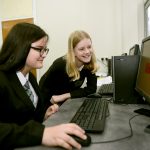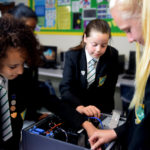Welcome to the ICT/Computing Department
As a Mathematics and Computing Specialist School, we are extremely well-equipped for the modern technological age. With up to date computer hardware and software, including Micro bit computers, a selection of Raspberry Pi’s and using cloud computing with Google’s GSuite, we feel that we are equipping students ready for the next phase of their computing lives.
We believe that all students should have the opportunity to gain a qualification in Computing/ICT before they leave school. In order to achieve this all students receive a lesson per week in Key Stage 3 in order to prepare them for a Computing course at Key Stage 4.
Enrichment activities include being a Digital leader, becoming a trained Cyber Ambassador, STEM activity program developing cyber defence skills and coding club.
Curriculum Content
Key Stage 3
Year 7
- Introduction to the school network
- Using Google applications
- Esafety
- Introduction to spreadsheets
- Computer Programming using Python
- Computer Systems
- Data representation
- Binary and hex numbers
Year 8
- Advanced Excel to create real world applications
- E-Safety including system security
- Programming using python
- Data representation including adding binary
- Computational thinking
- Algorithms
- Networking
Year 9 – Preparation for Computer Science
- Computer hardware and software
- Computer memory and storage
- Moral, legal, cultural and environmental concerns
- Project planning including a programming project using Python
- Systems security
- Computational Logic
- Programming techniques
- Introduction to writing algorithms using flowcharts and pseudocode
- Networking

Key Stage 4
For students who take GCSE Computer Science we follow the OCR GCSE Computer Science (9-1) syllabus.
GCSE Computing / Computer Science
Aims and learning outcomes
The aim of the course is to encourage students to:
- Understand and apply the fundamental principles and concepts of Computer Science, including abstraction, decomposition, logic, algorithms, and data representation
- Analyse problems in computational terms through practical experience of solving such problems, including designing, writing and debugging programs
- Think creatively, innovatively, analytically, logically and critically
- Understand the components that make up digital systems, and how they communicate with one another and with other systems
- Understand the impacts of digital technology to the individual and to wider society
- Apply mathematical skills relevant to Computer Science
OCR Specification
- Systems Architecture
- Memory
- Storage
- Wired and wireless networks
- Network topologies, protocols and layers
- System security
- System software
- Ethical, legal, cultural and environmental concerns
- Algorithms
- Programming techniques
- Producing robust programs
- Computational logic
- Translators and facilities of languages
- Data representation
All students have access to ICT suites during lunchtimes and after school. Many curriculum areas will also offer students opportunities to use the suites to support subject work.


